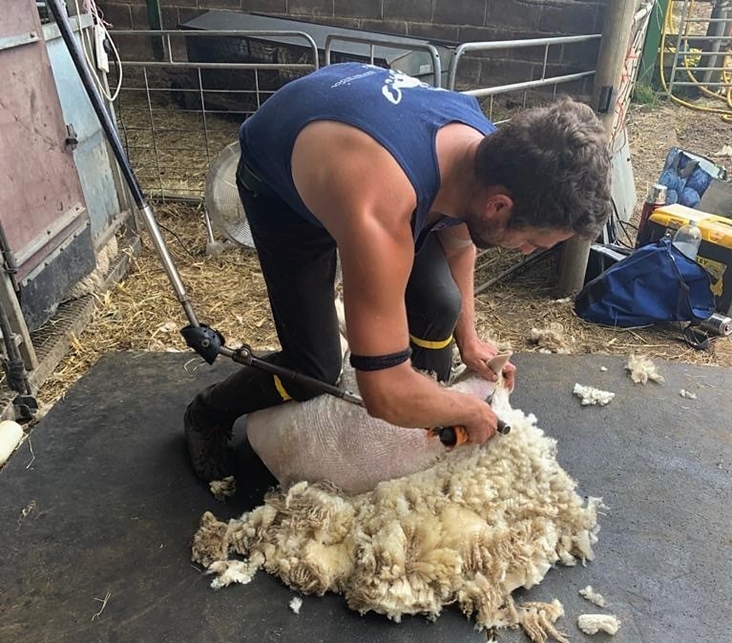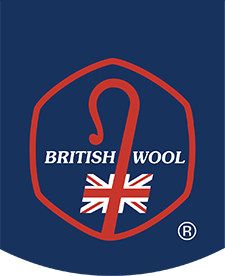British Wool chats with shearer, Paul Bowden and wool handler, Emily Gould
With the warm weather during April and May many areas saw a good start to the 2020 shearing season. Devon based shearer Paul Bowden and wool handler Emily Gould have been busy visiting farms in the area but took a few minutes from their busy schedules to talk to British Wool.
Paul:
Tell us a bit about yourself…
I grew up on a mixed beef and arable farm in Devon. I attended agricultural college as farming was always something I wanted to do.
What generated your interest in shearing?
My father and uncle were shearers, so the interest runs in the family! I was always heavily involved in the Young Farmers movement, which gave me the opportunity to attend a British Wool Blue Seal course. I continued with further training at Agricultural College and also attended a British Wool advanced shearing course, as well as starting to work for a local shearing contractor.
Describe shearing day to us, how do you prepare?
I like to try and be organised and plan ahead, whenever possible for a shearing day! I prepare, grind my gear and also pack everything that I need to take with me the evening before. My wife prepares my packed lunch, so all I need to do is get up, grab my lunch, jump in the pick up and away we go!
In the shearing sector, who is your greatest inspiration?
Roy Coker was the first to teach me the Bowen shearing method and then Alan Derryman. Alan is a great chap and such an inspiration to me and the UK shearers. His achievements in shearing are incredible and his contribution to UK and shearing globally is huge. I learnt so much from Alan on the advanced course I attended. Alan’s shear for charity last year was an amazing achievement.
What advice would you give to someone that’s new to shearing?
The British Wool shearing courses are an important starting point. I, like many shearers learnt so much from experienced instructors who teach on the courses. If you get the opportunity early in your shearing career, always shear with someone better than you that have a few years’ experience under their belts. It’s such a great way to develop further what you have learnt on the British Wool courses. Using good gear is also important as the best gear makes a difference.
What are your thoughts on the role of British Wool in supporting the UK shearing and sheep sectors?
British Wool’s role is important in supporting the UK shearing and sheep sectors. British Wool represents the industry’s best interests and their work in areas such as shearing training and marketing are important. If British Wool were not there, no other business would fulfil these key functions or support the industry like British Wool does.
Emily:
Tell us a bit about yourself and when you started wool handling
I’m 18 years old and have never lived on a farm. However, farming is in my blood as both grandparents are wool producers supplying British Wool. From an early age, I’ve always been around sheep, helping out with lambing when I was younger. I’ve always had a passion for animals and my career ambition has always been to become a vet. I plan to go to Hartpury University to study Bio Veterinary Science.
I was offered work experience by Paul helping out with lambing which I loved. This opened the door to Wool Handling and due to COVID-19, Paul was looking for a full time rousie to work with his gang so I took on the job.
Describe shearing day to us - how do you prepare?
I usually set the Alarm for 6.30am and have some breakfast to set me up for the day. The shearers pick me up between 7 and half past and once we get to the farm, I help set up the shearing & wool rolling area. Depending on how many shearers, sometimes this can be up to 4, this determines how busy I will be through the day! We’d normally have 2 – 3 breaks or if we are moving to different farms we’d eat on the go, the day usually finishes around 7 - 8pm
Name one thing you like about the job and one thing you don’t!
The one thing I like is that everyone in the gang gets along, its hard work but it is rewarding and good fun.
I’m not keen on fleeces that aren’t maintained as well as they could be.
Do you have any wool handling tips to farmers?
My tips to farmers would be:
- Dry sheep
- Clean shed
- Clean sheep - Crutched
- Ensure you have enough wool sheets & string
Is attending a British Wool course on wool handling something you’d be interested in for the future?
Yes definitely, I would love to learn more about wool.
What are your short and long term goals in terms of wool handling for the future?
Due to Covid-19, I’m planning to defer from University until September 2021. I’m looking at travelling opportunities to New Zealand to further my Wool Handling experience.
Back to Blogs Paul
Paul  Emily, throwing out the fleece before folding and rolling
Emily, throwing out the fleece before folding and rolling